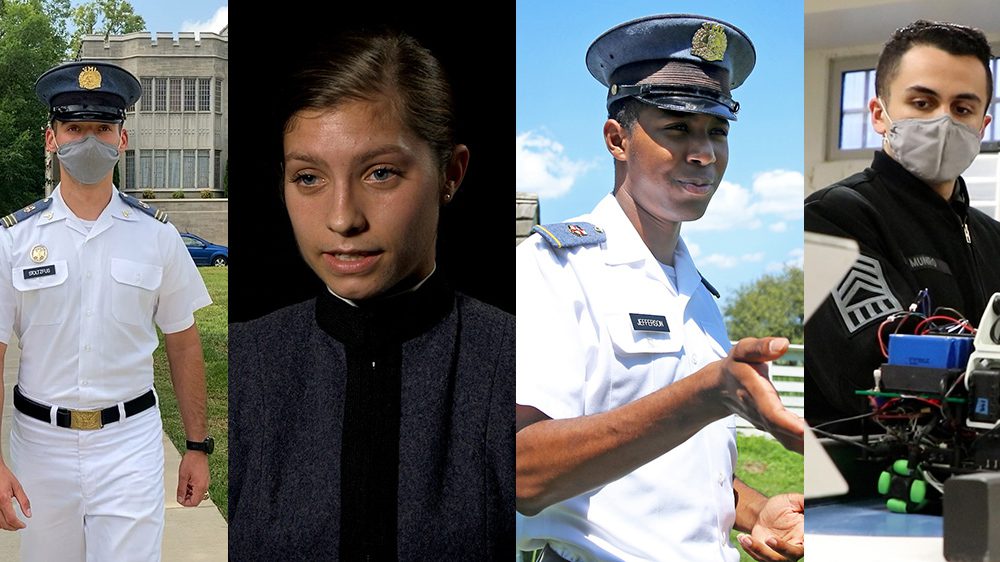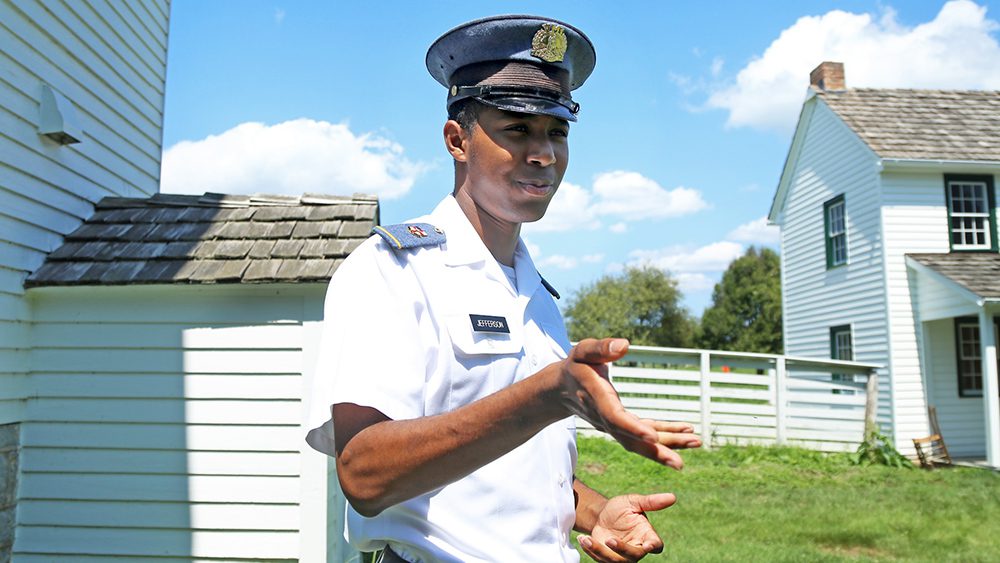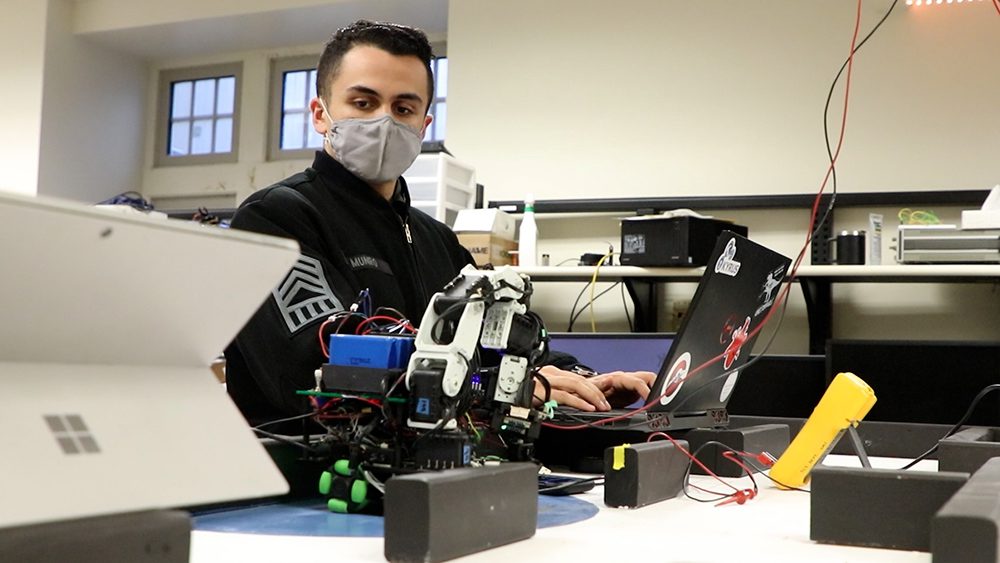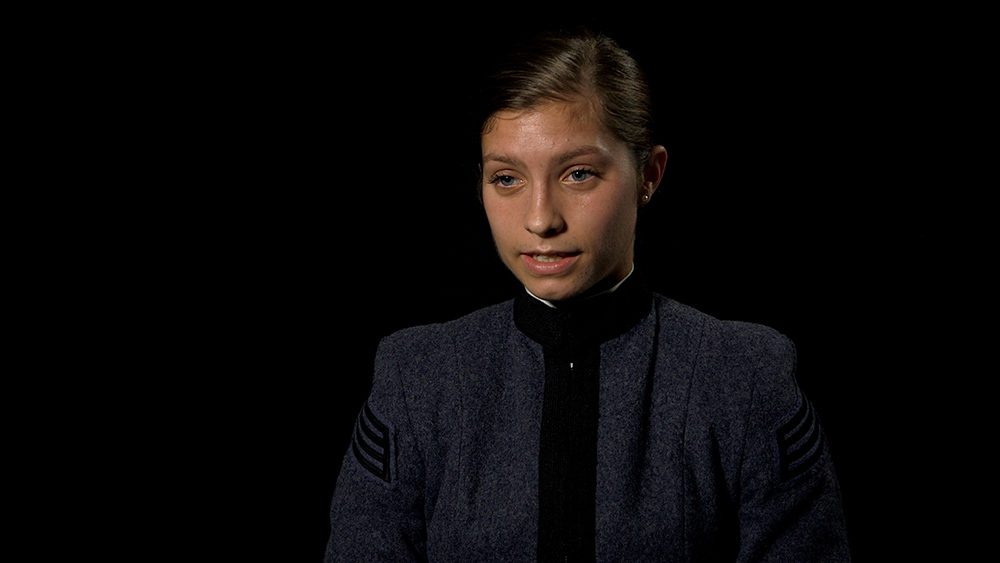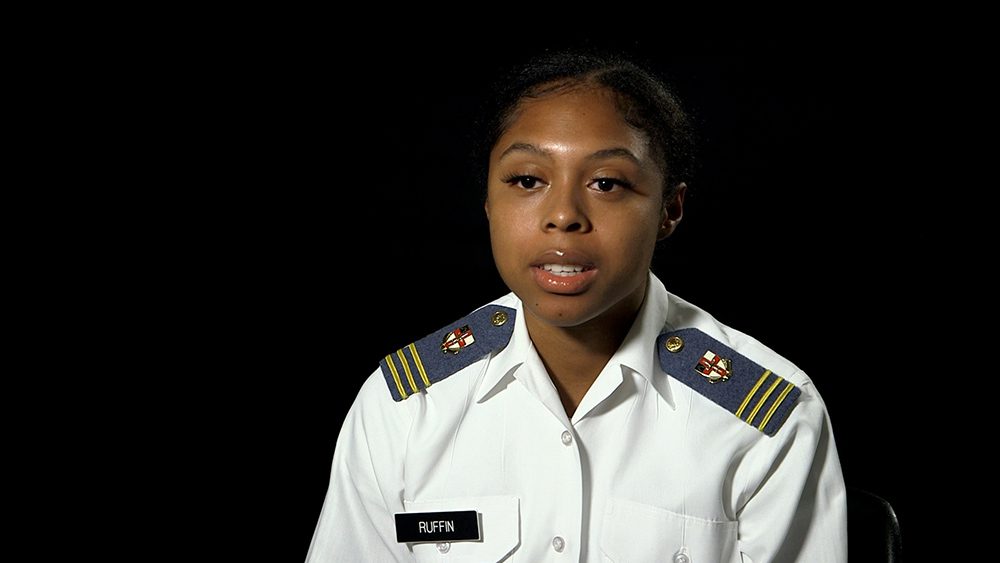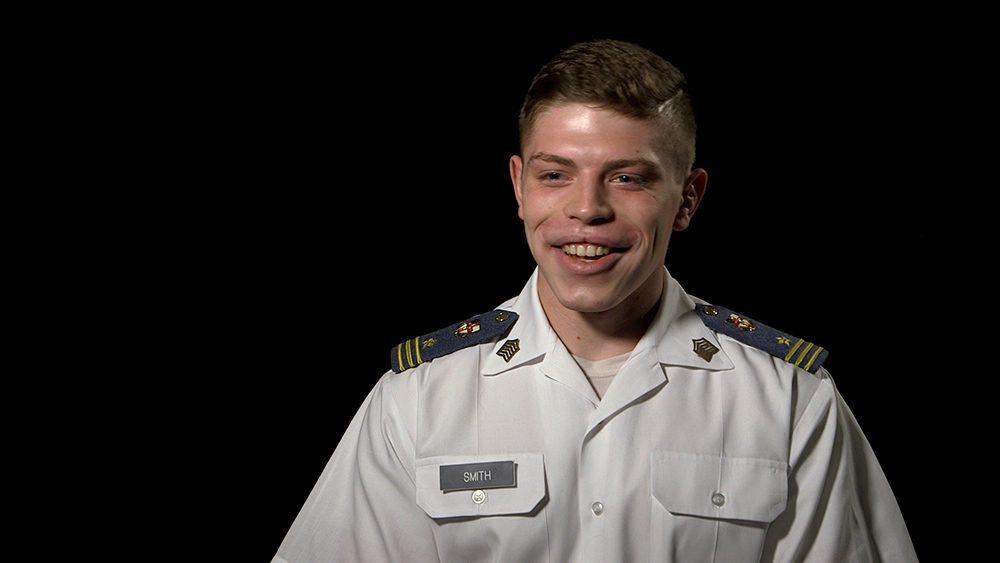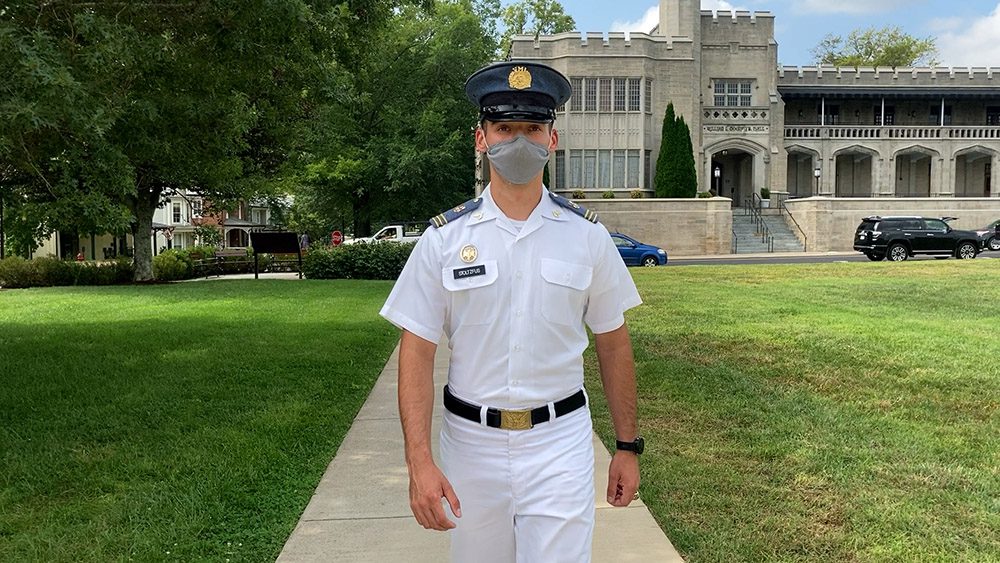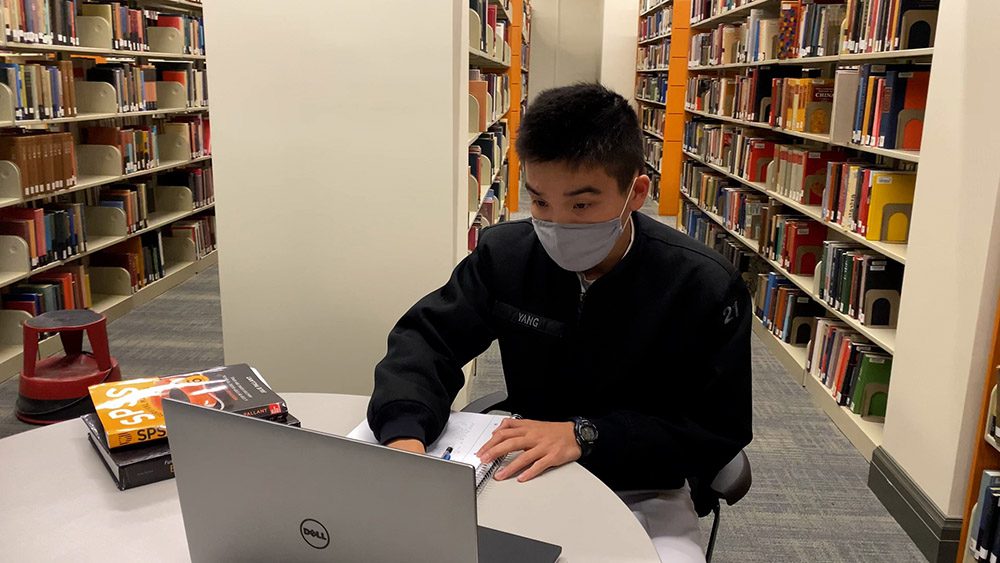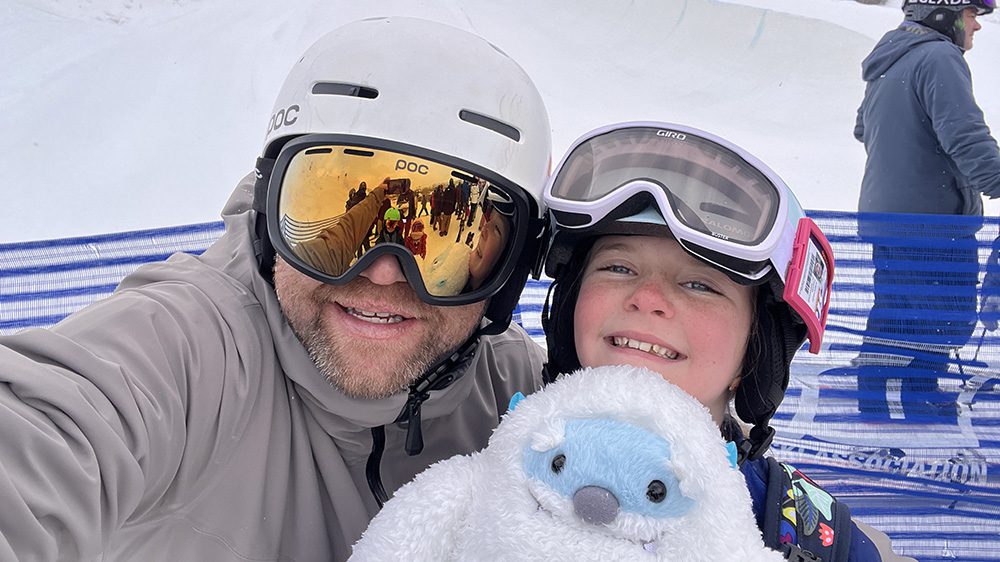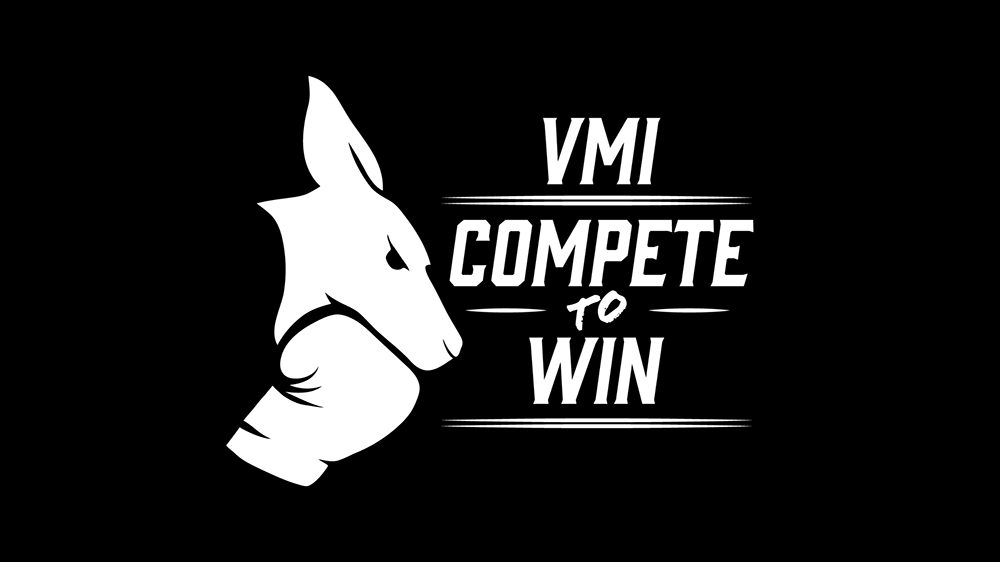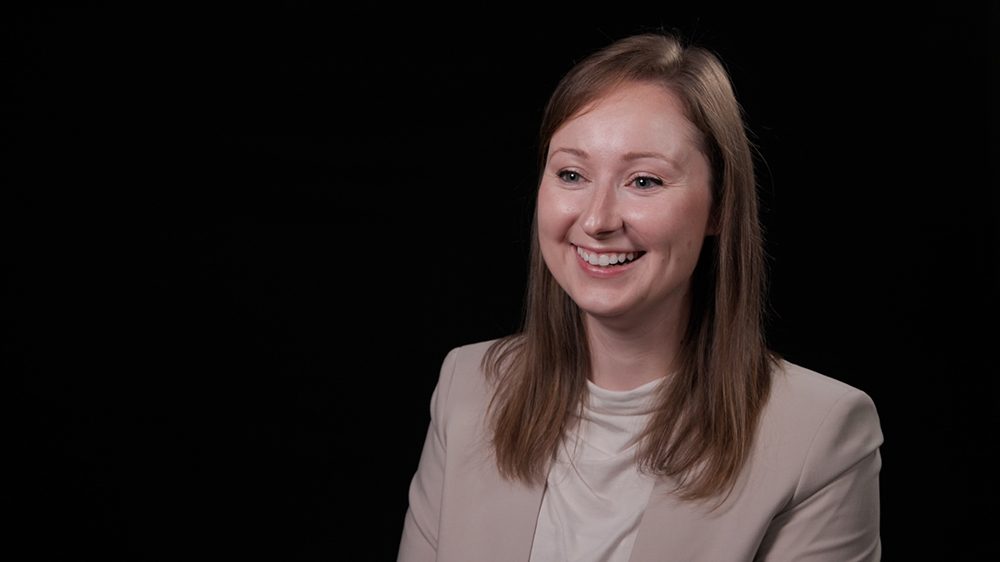This month, we are excited to share seven stories of impressive cadets who graduated over the weekend. Their majors, interests, and activities may vary, but they all are entering the world with lasting VMI values of honor and integrity.
Meet the Graduates
Drew Jefferson ’21 | Eric Munro ’21 | Emma Pratt ’21 | Ariana Ruffin ’21 | Troy Smith ’21 | Dylan Stoltzfus ’21 | Kevin Yang ’21
Cadet LeAndrew L. Jefferson III ’21, a Detroit native and international studies and political science major, first heard of VMI when E. Sean Lanier ’94 invited his high school to a college fair. Later, local Michigan alumni invited him to a Founders Day dinner. Alumni have walked him through VMI in many ways since then—supporting him, introducing him to others, and expanding his network.
“No other school will take care of you—before you’re even a cadet—like VMI [alumni] will,” Jefferson said, talking about how alumni have helped him. “They make sure you’ve got everything you need before you come, make sure you know everything you need to know before you come. And then they don’t just drop you off. They also walk you through your cadetship.”
Upon first learning about the Institute, Jefferson was interested, because he saw a challenge at VMI that he didn’t see at other schools. While cadets are at VMI, they have opportunities to learn how to do many different things. Chief among these is how to lead.
“[VMI] is the leadership laboratory; it’s OK to make mistakes,” he said. “Some mistakes might end up in a lot of PTs. … This is where it’s OK to make mistakes and learn from them and move forward.”
This year, Jefferson is one of four 1st Class cadet chaplains. The job “involves spiritual, mental emotional counseling and encouragement to … the entire Corps. Usually the first semester is oriented toward the rat mass and helping them and encouraging them to continue,” he explained. The cadet chaplains make sure every cadet has an outlet to speak, as well as a direct channel to talk to Col. Robert “Bob” Phillips ’87, Corps chaplain, and Maj. John Casper ’04, associate chaplain.
When Phillips taught the cadet chaplains, he told them they had to be “the nicest people in barracks,” Jefferson remembered. “You try to be the jack of all trades, resourceful. You try to be a good listener. And when the time comes, you try to be a good faith partner.”
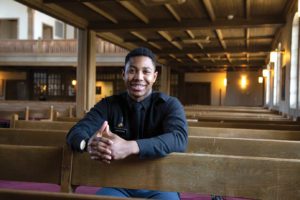
Cadet LeAndrew Jefferson III ’21, an international studies and political science major from Detroit, Michigan, is one of four cadet chaplains. He will commission in the U.S. Marine Corps after graduation. His education is funded through the Warren W. Hobbie Scholarship.—Photo by Micalyn Miller, VMI Alumni Agencies.
In the 2020-21 academic year, there were difficult situations. Jefferson talked to many cadets and always checked back in with them. Recognizing that one size does not fit all, if his counsel “didn’t work,” he’d ask another cadet chaplain, another cadet, or one of the VMI chaplains to help.
Jefferson is also part of the Promaji Club, where he is the councilperson for education. One of the club’s missions is reaching out to younger cadets to “make sure that they feel comfortable at VMI and that they feel that they have a channel to make their voice be heard here at VMI.”
An event held during his last semester at VMI made a big impact on him. It was a virtual question-and-answer panel, titled “Black History Month: Through the Lens of VMI.” The event was “very emotionally striking for me,” Jefferson said; it brought together many alumni “who hadn’t seen each other in years.” For him, personally, seeing this panel of Black alumni showed him “there is living, rich history here that we can recognize and celebrate much better.”
He experienced another area of history up close and personal when he spent the summer between his 3rd and 2nd Class years working—and living—at the Virginia Museum of the Civil War at New Market as the Shaara Scholar Intern in 2019. During his time in New Market, Jefferson lived in the Bushong house—with less than modern conditions. He had a solitary, “monkish” existence in the evenings. He read everything he could find about New Market. He learned about different stories of New Market: The Bushong family, the Bushong family’s slaves, the Corps of Cadets, the town of New Market, and the overall picture of the battle. He was able to explain these stories to visitors while he gave them tours during the day.
Jefferson receives a scholarship, the Warren H. Hobby Scholarship. The scholarship makes his time at VMI possible. It also allows him to have a different mindset. “[The scholarship] set my mind at ease to make sure that I can focus on the task at hand and the classes and make sure I’m doing everything I need to do here to be successful and not worry about paying the tuition,” he said. “Another great help to my cadetship has been from Mr. Walt [’72] and Meg Galanty, who have assisted me in tuition and guidance.”
He’ll commission into the U.S. Marine Corps this spring. Looking ahead, to after his own graduation, he would like to help future cadets the same way alumni helped him. “It’s up to me to pay it forward and make sure that I do the same thing for people to come,” Jefferson said.
Cadet Eric Munro ’21 isn’t a legacy. The electrical engineering major didn’t grow up hearing VMI barracks stories or watching the Keydets in Foster Stadium.
He knew one person in his hometown, Curtis Barker ’93, Ed.D., who attended VMI. Barker, his dual enrollment physics professor , would occasionally mention VMI. When Munro was a high school sophomore, a rat from the Class of 2018 visited during her winter furlough. She talked to students about the Rat Line and her day-to-day experiences.
What she had to say resonated with Munro. He stayed after class to talk to her. He also began asking Barker about his experiences at VMI and soon decided he wanted to attend the Institute. To become a cadet, he realized he needed to take school more seriously and improve his grades. Munro—the oldest of five children and first in his immediate family to attend college—also needed to figure out a way to finance college. He learned about Air Force ROTC scholarships and applied for and received one. He interviewed for the Institute Honors program during an open house and was awarded a scholarship and a spot in the program.
The day his acceptance letter arrived, his parents opened the mail, and his mom began to cry. (Munro, who watching TV, said he was “oblivious.”) That evening, his parents took him out to dinner. They presented the acceptance letter to him at the restaurant. He was “on cloud nine … absolutely elated.”
Once he matriculated and was in the Rat Line, Munro realized he did not know exactly what being a rat entailed and that VMI was an incredibly high-stress environment. Before a drill competition, Seamus O’Connell ’19, his master sergeant, told the company, “Pressure makes diamonds.”
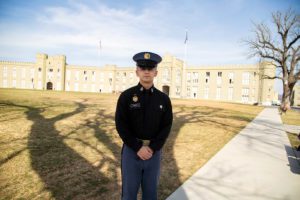
Cadet Eric Munro ’21 of Waynesboro, Virginia, is an electrical engineering major and the S2 captain. His education is funded through the Col. William H. Dabney USMC Class of 1961 Merit Scholarship.—Photo by Micalyn Miller, VMI Alumni Agencies.
“There is never really a day that goes by that you’re not subject to some form of stress, some form of pressure, some set of expectations that you feel as though you have to live up to,” Munro said. “VMI as a whole has been one long, uninterrupted sequence of pressure from a variety of different parties. What’s been kind of pulling me by the collar of my shirt through all this is that phrase, ‘pressure makes diamonds.’”
Upperclass cadets were instrumental in helping him navigate VMI’s demands. Nicholas Wainright ’20, his S2 representative, ran a friendly GPA competition between rooms. He would—out of his own pocket—buy pizza for the room with the highest average GPA. This impressed then-rat Munro: Here was an upperclassman who cared and cared enough to talk to rats and spend his own money. Through this, he learned, “It’s possible to be cordial with people, be friendly—but be viciously competitive.”
Edward Olbyrch ’18, an electrical engineering major and 1st Class private from his dykes’ class, believed the Rat Line stopped at the door of the academic buildings. He’d come to the rat study areas and talk to rats and would do tutoring sessions and give advice, Munro remembered. He’d bring in other 1st Class cadets “to talk to us lowly rats” about internships and their experience in the major. “He was a true academic mentor,” Munro said.
Munro’s education and experiences at VMI are funded partially through Air Force ROTC and partially through the Institute Honors program.
The Institute Honors program is not widely talked about in barracks, Munro said. Cadets who are selected for the program, called Institute Scholars, influence the Corps heavily. He knows many Institute Scholars who are cadets in charge of clubs or who hold leadership positions within the Corps, and the financial support they receive through the Institute Honors program is critical. “They’re able to spread so much leadership, they’re able to spread a good example to other cadets,” he said, noting that he doesn’t know “a single Institute Scholar who isn’t just an outstanding person.”
The Institute Honors program is supported by private donors, many of them alumni. Each spring, the VMI Foundation asks cadets to write thank you letters to their benefactors. “The letter I write to my donors is not just something on my to-do list,” Munro said. “It’s legitimately a heartfelt letter of appreciation.”
He writes how he’s doing in school, how his courses are going, about internships, summer training, how ROTC is going because “I think that these alumni supporters want to hear what the cadets that they’re supporting are doing.” When writing his benefactors, he also wants to communicate “just what their support results in.”
“There’s a lot of gratitude from the cadets for the support,” Munro said. “But I think the real reason [alumni] do this is because, even though they’re not here anymore, even though that they don’t have a direct role in what goes on in barracks, they know that with their support, they can still ensure that there’s a lot of good going on behind those walls.”
Munro will commission in the U.S. Air Force Reserve in May 2021 as a cyberspace effects operations officer. He will be working full time as a computer security engineer for Kyrus Technology.
Cadet Emma Pratt ’21 became interested in VMI when she saw her older brother, Gram Pratt ’18, changing for the better at VMI. She knew the changes were “legitimate, because you can’t hide much from family.” She also saw that Gram’s relationship with his brother rats was “real.”
“In today’s times, it seems very difficult to find real things anymore,” she said.
Looking back on her first week as a rat, Pratt “remember[s] those Hell Week runs and how everybody’s just struggling,” she said. “No matter where you come from or how physically prepared you are, it still is kind of a gut check.”
What encourages Pratt to push through difficult times, like those early runs, is when she sees growth. “You don’t always see that until after those intense moments of stress, those intense moments where you’re questioning, ‘Why did I come here?’ Am I enough for this?’” she said. Pratt is thankful she chose VMI, and thankful she has stayed.
A double major in Spanish and international studies, Pratt was able to spend a semester overseas in Salamanca, Spain. Traveling to her semester abroad was the first time the Floyd, Virginia, native and self-described “very small-town girl” traveled on an airplane.
In Spain, Pratt gained a level of independence. “You’ve got the scenery, you’ve got the food, but learning how to be independent—that was something that I really enjoyed,” she explained.
She functioned almost 100% in Spanish. Her host mother spoke no English, and she attended classes and navigated public transportation in her second language. Some parts of her time abroad were familiar—her host mother reminded her of her own grandmother—and some, like the busy city of Madrid, were 180 degrees opposite of anything Pratt had experienced before.
“VMI did prepare me for the utter chaos and confusion that was going on there,” she said, talking about taking the metro in Madrid.
Back on post, music in a couple of forms—whistling and piano—provided support and escape to Pratt.
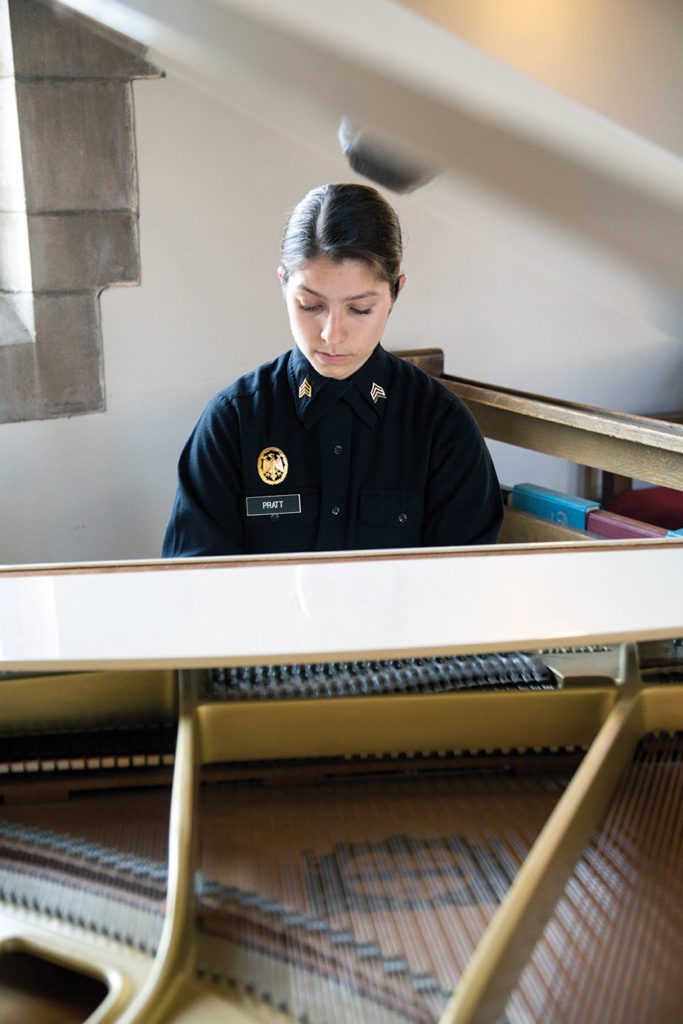
Cadet Emma Pratt ’21 is the Company C commander and double major in international studies and Spanish from Floyd, Virginia. Her education is funded through several scholarships, including the John E. Woodward, Jr. 1942 scholarship. She often slips into J.M. Hall to play the piano.—Photo by Micalyn Miller, VMI Alumni Agencies.
Her brother was part of her dykes’ class, but she “tried to stay away from him … I never wanted anyone to think that I was having an easier time because my brother was there,” she said. “His room was on first stoop. To get to my room, I would walk past it often.” When Gram’s door was open, she’d whistle a little tune and receive a cheerful, “Hey, Em!” in reply from her brother as she walked by.
Piano has been an outlet through her cadetship. When she’s looking for a quiet moment, Pratt (who plays by ear) slips into J.M. Hall and starts playing. As a rat, “to de-stress, I would go into J.M. and play piano a lot, in the dark. It’s a beautifully solemn place, where so many memories hang in the air. I found that time a great moment to take a step back and recharge and think about what I was doing, and that it was all worth it.”
As her years in barracks passed, she’s found it helpful to take those quiet moments in J.M. Hall and consider the big picture. For Pratt, piano is a form of self-care—necessary, in whatever form it may take, for any leader.
Last spring, Pratt was selected as the Company C commander. She went through a lot of reflection before applying for the post. She’s not perfect, she said, but she strives to be above reproach. “If you want to effectively lead people the way you want to, they have to trust you,” she said. “VMI is such a small community, and you get to know people very well over four years. Likewise, they get to know you. Having a reputation of loose principles and poor character leaves you very little ground to stand on when you’re trying to lead your peers.”
Two of Pratt’s roommates are also company commanders, which is “wonderful,” she said. Together, they can bounce around ideas and provide support. Having roommates in the same position also gives Pratt a unique window into how other leaders accomplish the same tasks.
The Institute is hard to explain and “impossible to quantify,” Pratt said, but a constant is that it remains “able to create an environment that produces capable and confident leaders.” She receives a variety of academic scholarships, which give her the freedom to look for fulfilling job instead of focusing solely on income. “Someone else sees the value in the school and sees that it’s still working and that it still is such a great benefit and resource to people such as myself,” she said. She’s written a few thank you letters but hopes to one day meet her benefactor, shake their hand, look them in the eye (without a mask on), and say, “Thank you for my education. It means so very much to me.”
Cadet Ariana Ruffin ’21 is one of the linchpins of VMI’s track and field team. The petite sprinter brought on the power during the team’s indoor season, notching first place finishes in the 200- and 400-meter races, and is the indoor conference champion in the 400-meter race. The Southern Conference took note; she was one of 11 conference Athletes of the Month in January 2021.
She was recruited by several colleges, including the U.S. Naval Academy, for her athletic prowess. An aspiring physician, Ruffin carefully looked at the college biology programs. The Institute fit the bill in both athletics and academics.
“I decided to attend VMI because I didn’t want to attend a college where I was going to get lost in a system,” she remembered. “I wanted to make sure that I was going to a college where my teachers knew my name; they would be able to … help me if I needed help.”
At VMI, she received assurance from the biology department and from the team that she, personally, would be important.
“I fell in love with the track program,” she said. “Coach Bernstein, when he recruited me, made me feel like I would be a huge asset to the team. And I didn’t feel like that at all the other schools [where] I was being recruited; I just felt like I was going to be … another number.”
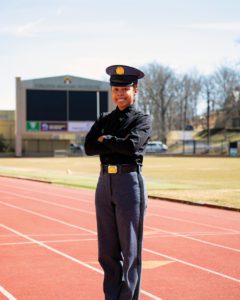
Cadet Ariana Ruffin ’21, a biology major and Cadet Equity Association vice president for investigations, is from Philadelphia, Pennsylvania. She’s a sprinter on the track team and won the 2021 Southern Conference championship title in the 400-meter race. Ruffin’s education is funded with the Goodall Family Athletic Scholarship and the Robert B. Rust Jr. 1934 Scholarship.—Photo by Micalyn Miller, VMI Alumni Agencies.
Ruffin’s contributions to the track team continued throughout her cadetship, and she feels “comfortable” academically. The biology department is “very homey for me,” Ruffin said. She often spends time sitting and talking with her professors, “because I know they have my best interests at heart.”
Some of her most difficult times at VMI were during her own Rat Line, when she had to balance NCAA practice with rat training. Her roommates helped her a lot, and her cadre were understanding and willing to help her make up for lost time and catch up on military training.
Another challenge came during Ruffin’s 3rd Class year. She was the senior cadet sprinter on the team—and there were six rats. Teaching and mentoring the rats fell to Ruffin, still a very new cadet herself. She carried a heavy load with the basics alone—making sure “her” rats were OK, advising them, and helping them get to the right place at the right time.
“It was a lot on my plate, because that was the first year where I didn’t have my dyke,” she recalled. “I felt like I was pretty much everybody’s dyke.”
The challenges from her 3rd Class year were foundational. She learned how to use different strategies for various situations and personalities.
“I think that really molded me into the leader that I am today,” she said. “I always was the type of person to … just worry about myself, but it forced me to really pay attention to how others felt and how to help them when they’re going through a difficult time.”
She has two favorite VMI experiences: The week leading up to Breakout and Ring Figure. The BR spirit for both was evident in “the amount of just the energy that was … in barracks and surrounding my class in general.”
When she’s not running, studying, or marching, Ruffin enjoys the cinema—and if she wasn’t pursuing a career in medicine, she’d look toward movies for a career.
“I think I would probably have been a movie director, or a movie critic, because I’m very interested in films,” she said. “I like critiquing, and I like studying different directors. I’m fascinated with Tim Burton, and James Cameron and Steven Spielberg.”
She also enjoys trying new restaurants and new types of food. Japanese cuisine is her current favorite, and visiting Japan, Thailand, and other Asian countries is on her bucket list.
Ruffin balances a lot between academics, athletics, and military duties. Aside from track and academics, she’s the Cadet Equity Association’s vice president for investigations. When things get tough, when her many spheres of responsibilities seem overwhelming, she thinks back to her Rat Line, what she has already completed, and her end goal.
“If I was able to finish the Rat Line, then I’m able to push through further down the line when there’s something difficult going on— whether I have a bunch of tests or I know this is going to be like a hard week of practice … I think about how far I came,” she said. “I think about how good I will feel once I’m done and finished and on my way to medical school. I think about the future, how I’m going to feel, and I just push on.”
As the regimental commander, Cadet Troy Smith ’21 is one of the Corps’ most recognizable cadets. He “absolutely” did not picture himself in this position when he matriculated. On that day, his thoughts were on leaving his family and the almost “insurmountable” challenge he was undertaking.
“I had no inkling that I would be the one this year standing in front of all those aspiring rats, those [who] just signed the Matriculation book, to give them the same kind of speech I heard three years earlier and prepare them for their journey,” he said. “It’s been completely humbling to be in this position. It’s been an honor, and I’m just living up to it the best I can, the way I was shown, and [with] what I’ve learned in my time here.”
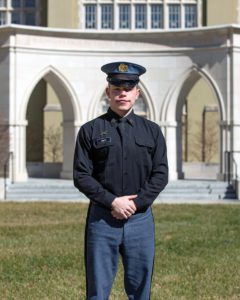
Cadet Troy Smith ’21 is the regimental commander and a computer and information science major from Waxhaw, North Carolina. He was selected to be in the Institute Honors program and receives funding for his education from the Mr. & Mrs. Robert D. Beeton 1987 Scholarship and the Stephen H. Sewell, Jr. 1960 Scholarship.—Photo by Micalyn Miller, VMI Alumni Agencies.
Like many cadets, Smith chose VMI because he had a desire to serve in the U.S. military—and because of the challenge. When selecting colleges, he only looked at military colleges. He has two older brothers, and one, Shane Smith ’15, attended VMI. Through his brother, Smith became familiar with the Institute. He considered and applied to other colleges, but in the end, VMI was what he chose.
When he looks at other colleges now, even service academies, he is certain he made the right choice. In his four years, he’s become part of a close-knit community, cultivated by VMI’s unique class system. “[It] brings you into a network of people who you can really rely on and that you feel invested in even once you’ve left the school,” he said.
Smith takes things one step at a time, while also keeping the big picture in mind. The computer science major and Institute Scholar looks at everything he needs to accomplish and breaks it down into prioritized tasks. He completes each task, then moves to the next. Smith’s method has proven effective: He has maintained a 4.0 GPA, has been part of the boxing team, is commissioning in the Army, and is a central part of a leadership team that has shepherded the Corps of Cadets through a difficult year.
“It’s really about mentally preparing … just taking it one step at a time, one task at a time,” he explained. “You’re not worried about the task five hours from now, you’re worried about what you’re doing that’s right in front of you.”
Smith’s assignment as the regimental commander was announced in spring 2020, shortly before COVID-19 changed the world. He knew the position involved tremendous responsibility; the pandemic compounded this. This year has been his most challenging at VMI.
“Trying to motivate and inspire and maintain discipline in a very unusual … setting,” has been tough, he said. There are always changes, many of which can affect cadets’ futures—plus, all cadets are still attending college and striving to do well academically. “Everybody’s looking to you like, ‘OK, what do we do next?’ And it’s hard because you don’t have the answers of what comes next.”
After the Corps was sent home in mid-March 2020 due to the coronavirus pandemic, Smith began a consistent stream of communication with other Corps and Institute leaders. His first task, announcing the rising 2nd Class’ rank appointments—was in civilian clothes from his living room. In meetings with leadership, every aspect of cadet life—from how cadets would eat in Crozet Hall to what rat training would look like—was covered. Corps leadership held a virtual retreat over the summer and were able to return to post earlier than usual.
His spot at the top of VMI’s cadet military structure would be lonely, Smith said—except for his brother rats. He’s grown close with Cadet Dylan Stoltzfus ’21, class president, and had excellent support from other Corps leaders, including his executive officer, staff captains, and battalion commanders. The group has “made some hard decisions together.” It’s “definitely the BR spirit in action,” Smith said.
When he has free time, he’s enjoyed the boxing club—this year, a casualty of the coronavirus. He also writes short stories and poetry. He was published in Cadence, the cadet literary magazine, last year. “There are a few ways, especially these days, to express the extra energy and to kind of get your own creativity … out there,” he said. “Especially when the majority of my days consist of military regimen, kind of following procedure and protocol, it’s nice to have a creative outlet.”
In May, Smith will pin on gold bars and start a new journey as an officer in the Army’s military intelligence branch. He’ll actually begin his military service as a field artillery officer. He is part of the Army’s branch detail program, which lends junior officers to a combat branch for a few years before they transition to their basic branch.
The 2020-21 academic year “has caused us to have to grow up a lot faster,” said Cadet Dylan Stoltzfus ’21. He’s the 1st Class president and, together with other cadet leaders, has brought the Corps through a different, difficult year. One of the silver linings in it has been his friendship with Cadet Troy Smith ’21, regimental commander.
“I don’t know that there’s ever been a class president and regimental commander duo that has worked tighter than we have this year. We’ve been in lockstep on everything,” Stoltzfus said. “When we’re frustrated, we’re frustrated together. When we need to talk to people, we do it together. When we have questions or want to bounce ideas off each other, we do it together. [We] are tight. He’s my brother.”
To the Corps, the mechanical engineering major has been the face and voice of unwanted news many times over. He’s had to tell the Corps everything from the “beyond painful” news that rat-dyke visitation was suspended to more minor annoyances, like 1st Class cadets having to move their cars.
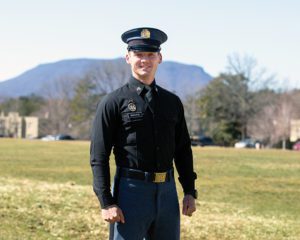
Cadet Dylan Stoltzfus ’21 is the 1st Class president and a mechanical engineering major from Kernersville, North Carolina. He was awarded a four-year Army ROTC scholarship and will commission into the infantry in May 2021.—Photo by Micalyn Miller, VMI Alumni Agencies.
“I think that anything worth doing is worth doing the right way,” he said. He’s learned that he can’t necessarily give everyone what they want, but he can talk to them when they’re frustrated and be there for them. He’s learned tact and how to tell people things they don’t want to hear.
In high school, he looked at many colleges. He chose VMI for two major reasons: Honor and brotherhood.
“VMI teaches that honor is the one thing you can control. We live in a world right now, where … people believe that the only way to get ahead is by degrading others, taking credit for the works and thoughts of other people, and just sacrificing your morals and your ethics to get to the top,” he said. “Having honor means that you have discipline as well,” he continued, explaining that at VMI “everybody’s under the same pressures, the same expectations.”
“Height is the only thing that dictates what group you’re going to be around,” he said. “You have a mix of different ROTCs, different majors.”
The shared experience builds inspirational bonds. At VMI, milestones come as a class. “You get one experience with all your brother rats to Breakout, one experience through Ring Figure, one experience of walking across the stage. And when you start off with that group, you want to finish with them.”
Stoltzfus has put in many, many long hours this year. Some have been devoted to studying, some to ROTC. Many, though, have been in support of his fellow cadets, in support of the shared experience—planning and preparing for Corps activities and functions.
“VMI is absolutely cadet-led,” he said. “And that means after your academics are done—at possibly one or two in the morning—you’re going to have to continue on and prepare for the next day.”
On those long nights, he thinks of the speaker at his own Breakout—a Navy SEAL alumnus who had been the RDC president, a mechanical engineering major, and captain of the rugby team during his cadetship—all things that take an enormous amount of time.
“He told us,” Stoltzfus remembered, “that he got more sleep during BUDS training than he did [at VMI].”
The VMI system is hard, but it prepares cadets for each step they take in barracks, and for whatever challenges they will face after graduation. The system builds confidence. In earlier years, Stoltzfus served as a cadre corporal and a company first sergeant.
“All the experiences that I’ve gone through these past three years have culminated this year … even under these circumstances, the past few years have prepared us for it,” he said, talking about himself and his BRs. At the beginning of the academic year, the Class of 2021 accepted the changes COVID-19 threw at them, realizing “nothing can stop time,” and decided “we’re going to make the most of it.”
When he leaves VMI, he’ll make the most of his next chapter. Stoltzfus will commission into the U.S. Army, as an infantry officer—his No. 1 branch choice. He’s looking forward to applying what he’s learned as a cadet when he reports to the Army’s Infantry Basic Officer Leaders Course in Fort Benning, Georgia, a few short weeks after graduation.
And, just maybe, he’s also looking forward to getting a little bit more sleep.
When Kevin Yang ’21 became interested in the Institute, his parents weren’t so sure about the military aspect, but once they heard more about how VMI trains cadets to be honorable leaders, they approved.
“We actually would like that of you,” Yang’s mother said after an open house. “It’s OK, I’ve always been strict on you; you’ll make it through.”
For Yang’s part, he was “awed” by the camaraderie and brotherhood he saw at VMI. He applied to the Institute Honors program. When the letter came, he left it on a table overnight. When he opened it, his hands were shaking—but the envelope contained good news. He had been accepted to VMI and chosen to be part of this Institute Honors program. Cadets selected for this program are called Institute Scholars and also receive scholarships.
He hasn’t regretted his decision. He had learned a few things at the open house but quickly realized on Matriculation Day that he “had no idea what to expect.”
“It was a totally different type of experience; nothing I expected at all,” Yang said, thinking back. “It was total shock. As soon as you sign that book, you’re shuffled away, and boom! Your experience starts.”
One of his favorite experiences at VMI was shortly after Breakout. He and his roommate joined the running club. They competed in a 10-kilometer race and finished No. 1 and No. 2 spots in their age group.
Aside from the Rat Line, Yang’s major—electrical and computer engineering—has also been tough. The Class of 2021 began with 32 in the major. About half remain. Some of Yang’s best friends are also ECE majors. When things get tough, “the No. 1 thing” that keeps him going are these friends. The group is very close knit and always looks out for each other; Yang is certain he would not have had the same experience at another college.
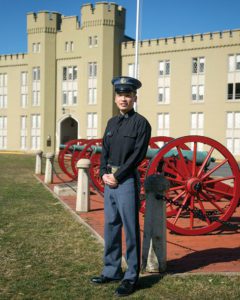
Cadet Kevin Yang ’21 is a 1st Class private and electrical engineering major from Alta Vista, Virginia. He was accepted into the Institute Honors program and through that, receives a scholarship which funds his education. —Photo by Micalyn Miller, VMI Alumni Agencies.
During his 1st Class year, he’s been the assistant program manager for the electrical engineers’ capstone. This year’s project is building a robot for the Institute of Electrical and Electronic Engineers SoutheastCon, the annual IEEE conference. This year’s design, chosen by the IEEE, is a Pac Man style robot, Yang explained. Students need to build and program the robot to go through a maze, pick up pellets, and avoid ghosts.
Looking back to when he matriculated, Yang said the biggest change he sees in himself is his overall maturity. “The Rat Line kind of teaches you what’s right and what’s wrong,” he said. “But it … doesn’t force you to do that. You have to … improve yourself, be a better person, and that takes a degree of maturity I think all cadets here have.”
His parents, who immigrated to the U.S. from China as teenagers, are excited to see Yang graduate in May. Graduation will be “a really special moment for me and my parents,” he said. “They didn’t know what college was like. My mom was so worried that, ‘Oh, no, not only are you going to college, but you’re coming to VMI. And that that military lifestyle, it’s just going be so hard on you.’ But now … she’s just so proud of me. And she can’t wait for me to walk across that stage.”
Yang’s education at VMI is funded through the Institute Honors program. When Yang became an Institute Scholar, he didn’t just enter a prestigious academic program. The academic stars he wears on his collar are a return on investment for his benefactors. “Without my scholarships from the alumni, I wouldn’t be able to come here,” Yang said. “It’s essential to me.”
The program goes beyond funding educations. Institute Honors cadets are required to take certain classes and to talk about many issues—some controversial, some not—with fellow cadets.
“The whole program in itself has just been wonderful to me,” he said. “It really opens my eyes when there’s a whole array of opinions different for your own, and without honors forum … you really don’t get to speak out and talk in a civil manner to lots of different cadets from totally different backgrounds and political standings.”
As a high-schooler, when Yang interviewed for the scholarship and the program, one of the interviewers told him they were not looking only for academic superstars—they were looking for cadets who “could make a difference.” They were looking for a “mindset.”
Going forward, Yang will carry that mindset with him. He is planning on going into engineering following graduation. He wants to rise the ranks and face different challenges in the workforce.
“And I think VMI has definitely prepared me for that.”
At the time of this writing, Yang had accepted an offer from General Dynamics Electric Boat in Connecticut.
-

Molly Rolon Editorial Specialist

Christian Heilman Director of Digital Content
The director of digital content is responsible for creating original video and multimedia materials, as well as developing and editing web and digital content. The director is responsible for platform coordination and troubleshooting, to include the VMI Alumni Agencies’ primary websites, digital newsletter and other digital platforms.

